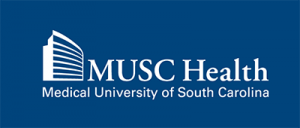MUSC board votes to approve request for two certificates of need, receives mid-year reports
February 15, 2021Recently, the Medical University of South Carolina (MUSC) and Medical University Hospital Authority (MUHA) Board of Trustees met for their regularly scheduled combined committee sessions and board meeting. In light of the ongoing COVID-19 pandemic, many attended the meeting via video conference. Those who gathered in person in the MUSC boardroom observed appropriate safety protocols, including wearing masks and social distancing. In addition to updates on its education, research and clinical care operations, the board received a primer on how the mRNA vaccine works, as well as information on how MUSC Health is administering the Pfizer BioNTech vaccine and how the health system is working to reduce vaccine hesitancy.
“During this pandemic, our team focus remains to serve communities across the state with engagement on multiple levels, including getting vaccines into arms, providing virus testing, delivery of the newest, most effective therapies to treat COVID-19 patients, and continuing education about safety and prevention,” said David J. Cole, M.D., FACS, MUSC president. “We are also working at a grassroots level to plan and execute vaccine distribution to at-risk and rural communities as the limited vaccine supply permits,” Cole said.
“To date, we have received 83,850 vaccines and administered 85,407 vaccinations,” said Patrick J. Cawley, M.D., MUSC Health CEO and vice president for Health Affairs, University. “The nearly 102% doses administered includes accounting for the extra doses found per vial.” Cawley observed, “This week has been particularly challenging due to last-minute supply issues that are out of our control, forcing us to move and reschedule vaccine appointments.”
Despite the enduring challenges of the pandemic, MUSC continues to transform and grow. The board voted to support filing two certificates of need (CON) with the South Carolina Department of Health and Environmental Control (DHEC) for the deployment of a linear accelerator in Lancaster County and a surgical robot for MUSC Health, Lancaster Medical Center. DHEC must issue a CON before certain types of health care acquisitions, expansions and creation of new facilities are allowed. A linear accelerator is commonly used by a radiation therapist to deliver external beam radiation treatments to cancer patients. A surgical robot serves to extend the physical capabilities of surgeons, adding the most advanced and refined technology at the fingertips of surgeons to benefit patients.
The board voted to appoint Martin Steed, DDS, FACS, to the James B. Edwards, DMD, Endowed Chair in Oral Surgery, effective March 1. Steed is a professor and chair in the Department of Oral and Maxillofacial Surgery, and associate dean for Hospital Affairs in the College of Dental Medicine.
The board also reviewed and endorsed the proposed new enterprise strategy – OneMUSC. The focus of the strategy is to empower and propel team members to achieve greater innovation, impact and influence over the next five-year period. One such enterprise-wide initiative, the MUSC Workday Implementation, was shared with the trustees.
Workday is a state-of-the-art platform that will transform, integrate and standardize MUSC business processes across finance, human capital and supply chain across all three major areas of MUSC – the university, MUSC Health and MUSC Physicians. It will consolidate some 70 different human resources, finance and payroll systems into a single core cloud-based system. In addition to simplifying workflows, Workday will also empower employees to complete human resources and payroll actions from anywhere using mobile devices.
In other business, the 16-member MUSC/MUHA board also voted to approve the following items:
- Improve access to high quality breast imaging in the community by locating 3D mammography at the MUSC Health West Ashley clinic.
- A capital budget request of $2.9 million for renovations at MUSC Health, Chester Medical Center.
- A lease amendment to continue providing 46,857 square feet of space to the Department of Veterans Affairs on the MUSC main campus in Charleston.
- Renewal of an 11,494 square feet lease for office space on Doughty Street in Charleston to continue providing space to support the Department of Psychiatry, Clinical Neuroscience Division, drug abuse research training, and the South Carolina Clinical and Translational Research Institute.
- Renewal of a lease for 6,414 square feet of clinical space on Hospital Drive in Charleston that supports delivery of therapeutic services, physical therapy and occupational therapy in the Mount Pleasant area.
- Execution of a new lease agreement for 4,500 square feet of clinical space on Charlotte Highway in Indian Land, which will provide sites for Lancaster pediatrics and a multispecialty clinic.
- Renewal of a lease for 4,200 square feet of clinical space on West Meeting Street in Lancaster to continue providing space for MUSC Health general surgery.
- A lease renewal for 1,143 parking spaces in the Hagood parking lot located at Fishburne Street and Hagood Avenue.
The MUSC/MUHA Board of Trustees serves as separate bodies to govern the university and hospital, normally holding two days of committee and board meetings six times a year. For more information about the MUSC Board of Trustees, visit http://academicdepartments.musc.edu/leadership/board/index.html.
About The Medical University of South Carolina
Founded in 1824 in Charleston, MUSC is the oldest medical school in the South as well as the state’s only integrated academic health sciences center with a unique charge to serve the state through education, research and patient care. Each year, MUSC educates and trains more than 3,000 students and nearly 800 residents in six colleges: Dental Medicine, Graduate Studies, Health Professions, Medicine, Nursing and Pharmacy. MUSC brought in more than $271 million in biomedical research funds in fiscal year 2020, continuing to lead the state in obtaining National Institutes of Health funding, with more than $129.9 million. For information on academic programs, visit musc.edu.














